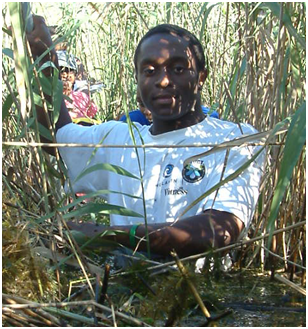Youth for Eco-Justice: Suwi Siwila
October 29, 2011 in Church, Ecological Justice, Ecumenism, UN, Youth participation
The World Council of Churches and the Lutheran World Federation co-organize Youth for Eco-Justice, starting parallel to the UN Climate Change Summit in Durban, South Africa, at the end of November. In a series of blog posts, the participants are introducing themselves.
Name: Suwi Siwila
Age: 22
Function: Geography and Environmental Management (Hon’s)
Country of origin: Zambia
Church of origin: St Margret’s Methodist Church of Zambia
What is really important for your life?
The most important thing to me is the youth, as a youth myself I feel we hold the key to the future not only with concerns relating to climate change but also relating to our faith. As society is an ever changing, dynamic entity the youth have and will continue to play an integral role in shaping society. For this very reason I strongly feel youth driven initiatives are a huge investment into the future of this planet as we are the biggest consumers of social media, information and hold the key to any action orientated plans. The best way to do this is by passing knowledge onto the youth and educating them of the social and environmental issues facing the globe today can be a means of initiating interest and change for the youth.
What are your wishes for the negotiations on Climate Change in Durban?
My prayer is that the negotiations in Durban yield transparency and justice in climate change. With scientific evidence in hand i hope leaders are not blinded by financial gain to neglect environmental concerns raised by experts from various fields. I would also like a positive reaction to measures that reduce the risk of increasing climate change, by taking immediate action. Let development not become an escape goat for irreversible damage of the environment. The most important thing is that at the end of COP 17 a reasonable conclusion should be reached especially from the global power houses which are contributing a lot more too environmental damage and risk on a global scale. Environmental justice summarises what I hope is achieved in Durban with emphasis on encouraging public participation in development projects that may threaten the well being of people and the environment.
What would you like to do so that your church/country becomes more environmentally just?
I would like firstly to equip myself with as much knowledge as I can on issues relating to environmental justice and climate change on both a community based scale and on a regional scale. I would like to expand on a programme I am currently involved in which runs awareness campaigns targeting schools within my community on issues and matters concerning climate change and ecological foot print. I would also like to bring up or incorporate issues of environmental justice and the role the church should play in insuring eco-justice to the people it is preaching the gospel too. This can be achieved by practicing environmentally friendly measures at church and then extending onto church homes. Lastly i would suggest that the church look into establishing a stance on environmental justice not only in practice but in theory as well.



This is a powerful insight I really enjoyed reading your reflection. I think it is for us to initiate charge as youth. I f development starts with the youth it is likely to yield good result. if all stakeholders of the world join hands together both the West and the South nothing is impossible. I think development to me is the ability of the community to be able to identify a problem and try to find a solution to it. Lastly it is my plea also for the church to promote interfaith dialogue to promote climate change. It is my prayer that the negotiation taking place in Durban should yield posative results for the entire world.